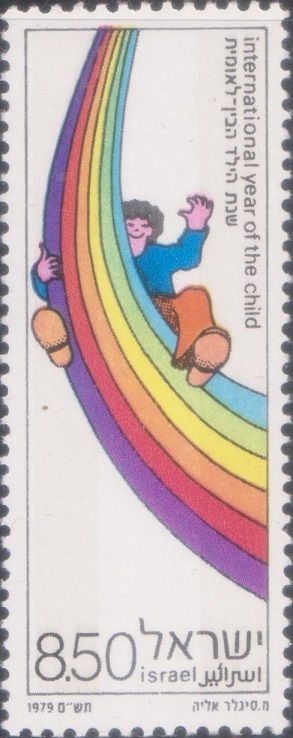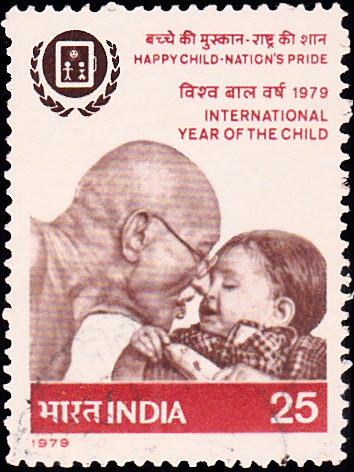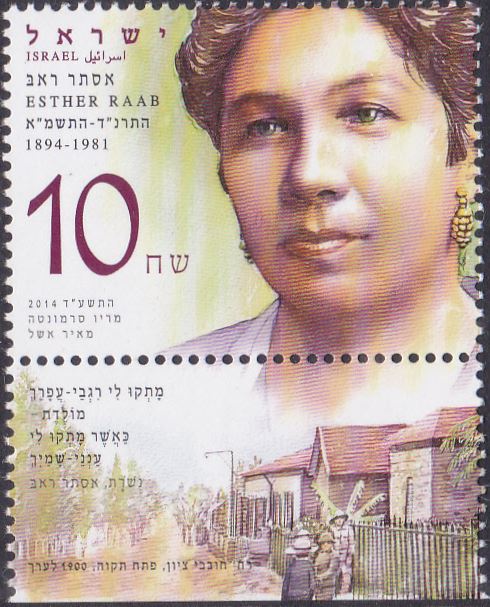
Israel on International Year of the Child 1979
A commemorative postage stamp on 1979 International Year of the Child (IYC), proclaimed by UNESCO :
 Issued by Israel
Issued by Israel
Issued on 13 Nov, 1979
Designer : Miri Siegler–Eliya was born in 1955 in Tel Aviv. As part of her high school education, she studied sculpture at the Avni Institute in Yafo.
Her work has been shown at amateur exhibitions at ZOA House in Tel Aviv.
She is currently completing her studies at the Bezalel Academy of Art in Jerusalem.
Type : Stamp, Mint Condition
Colour : Multi colour
Denomination : 8.50 Pound
About :
- The importance of the “International Year of the Child” lies in the certainty that children constitute the future. No investment is more crucial for humanity. The keynote of the Resolution passed by the General Assembly of the United Nations, declaring 1979 the “International Year of the Child” is to focus attention on children’s needs.
- The objective is to achieve higher priorities for policy and action on their behalf and a higher level of investment, particularly for the most disadvantaged. By providing a framework for advocacy, it is hoped that the process of integrating programmes for children in comprehensive economic and social development policies will be accelerated.
- The 1959 U.N. Declaration on the Rights of the Child is the basis for re-examining legislation and improving implementation. In accordance with the recommendations issued by IYC Headquarters in New York and Geneva (UNICEF is the Agency), Israel established a National Commission, under the Patronage of Mrs. Ofira Navon, wife of the President of the State. All government ministries and public organisations providing services for children are members, as well as many non-governmental organisations, whose voluntary efforts have established a network of institutions and projects for Children.
- Israel is a child-oriented society, in the spirit of Jewish tradition, which venerates the family, giving central attention to children and their welfare. This has expressed itself in legislation, providing for children’s basic rights and needs – education, health, and comprehensive welfare services. Innovative programmes have been introduced to meet the special and exceptional circumstances with which the country has had to cope.
- Both prior to and following Independence in 1948, thousands of children, victims of the War and the Nazi Holocaust, whose parents had disappeared, were rescued and rehabilitated. Subsequently, educational frameworks were provided for the children, deriving from some hundred different ethnic groups, when they flocked to their new homeland from countries in which their position had become untenable. Representing different levels of culture and standards, in terms of modern civilization, their absorption presented many challenges. Each succeeding government has recognised the primacy of children’s needs and acted accordingly.
- The necessary services are available to ensure the well-being of children, but there is a constant need to strive for better delivery and quality. There is still discrimination in favour of the most deprived children and those with handicaps. When the former can be dealt with at the same level with equality of opportunity assured, the bridging of social, educational and cultural gaps will have been achieved.
- Whilst the central objective is to ensure improvement and better policies for children, particularly in countries where the poorest and most disadvantaged are concentrated, IYC is also doing everything possible of joy and fun of childhood for the children themselves.
- There are many competitions and events for children, national and international. Communication between children in different parts of the world is achieved in many ways as children themselves recognize their affinity to one another. The learning process leading to increased understanding, knowledge and tolerance has received particular impetus.
- The more industrialized and the less advanced countries of the world have come to realize that they all have to cope with children’s problems due to poverty, neglect and handicaps, even though the circumstances differ. Israel joins together with all countries who believe that “mankind owes the child the best it has to give”, and are determined to ensure that the new generation will be healthy and happy, well prepared to meet the challenges of life.
- This stamp, honouring IYC, shows a typical Israeli with his “kova tembel”, sitting astride a rainbow with hope, with humour, aspiring upwards, free and happy. May all the stamps issued in the world for IYC become the symbol of the universal hope that children will know only the joys of childhood and neither hunger, war nor poverty.








[…] proclamation of a year dedicated to the child’s cause. 1979 was observed world-wide as the International Year of the Child (IYC), and India became the first country to pledge funds for global efforts to improve the lot of […]